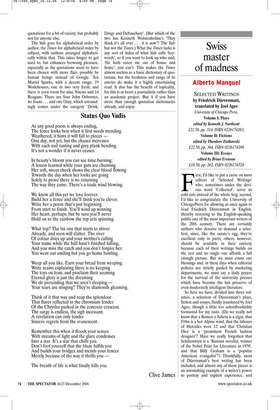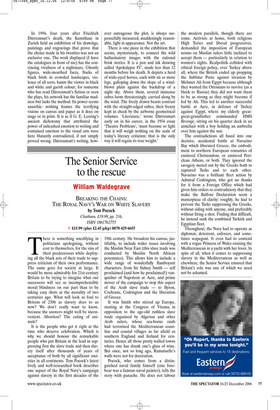Swiss master of madness
Alberto Manguel
SELECTED WRITINGS by Friedrich Dürrenmatt, translated by Joel Agee University of Chicago Press, Volume I: Plays edited by Kenneth J. Northcott £22.50, pp. 314, ISBN 0226174263, Volume II: Fictions edited by Theodore Ziolkowski £22.50, pp. 364, ISBN 0226174298 Volume III: Essays edited by Brian Evenson £18.50, pp. 202, ISBN 0226174328 First, I’d like to put a curse on most editors of ‘Selected Writings’ who, sometimes under the devious word ‘Collected’, serve us cold cuts instead of the whole hog; second, I’d like to congratulate the University of ChicagoPress for allowing us once again to read Friedrich Dürrenmatt in English, thereby restoring to the English-speaking public one of the most important writers of the 20th century. There are certainly authors who deserve or demand a selection, since, like the curate’s egg, they’re excellent only in parts; others, however, should be available in their entirety because each of their writings builds on the rest and no single one affords a full enough picture. But we must count our blessings and, in these days when editorial policies are strictly guided by marketing departments, we must say a daily prayer for the survival of the university presses which have become the last preserve of even moderately intelligent literature.
So here we have, divided into three volumes, a selection of Dürrenmatt’s plays, fiction and essays, fluidly translated by Joel Agee, though a little too schoolbookishly footnoted for my taste. (Do we really not know that a Romeo y Julieta is a cigar, that Föhn is a hot Alpine wind, that the labours of Hercules were 12 and that Christian Dior is a ‘prominent French fashion designer’? Have we really forgotten that Solzhenitsyn is a ‘Russian novelist, winner of the Nobel Prize for Literature in 1970’, and that Billy Graham is a ‘popular American evangelist’?) Thankfully, most of Dürrenmatt’s best writing has been included, and almost any of these pieces is an astonishing example of a writer’s power to portray and explain experience, and then subvert the whole procedure by opening up his arguments to unanswerable questions. Reading Dürrenmatt’s work leaves us with the impression of having witnessed the creation and then the explosion of a small galaxy. The light continues to reach us long after closing his books.
Born in 1921 near Bern, the son of a Swiss pastor, Dürrenmatt studied philosophy at the university of Zurich but never wrote his doctoral thesis. After hesitating for a while between becoming a painter or a writer, he chose the latter (he said) prompted by the sight of the memorial to Georg Büchner in Zurich, whose Woyzeck he was later to declare ‘the model of a modern play’. Like so many sane people, Dürrenmatt believed that the world’s essential quality is its madness; that is to say, the absence of a consequent and meaningful organising system. What we do, who we believe we are, what we wish for and by what means we intend to obtain it, though vaguely excused in our daily life through tricks of fallacious reasoning, cannot be understood except as part of a chaotic turmoil in which the consequences of our acts — lasting pain, sudden joy, destruction, desolation and premature death — do not prevent us from acting the way we’ve always done. The old metaphor of the world as stage suits Dürrenmatt perfectly to play out our own games in front of us. ‘I think dramaturgically,’ he wrote in his ‘Monster Lecture on Justice and Law’. ‘That is, my intellectual method as a dramatist consists in transforming the social reality of man into theatre, and then using this transformed reality to investigate matters further. By playing out the world, I think the world through.’ Not that there is, according to Dürrenmatt, any hope of changing our mad conduct through thought. Like Kafka, he willingly concedes that ‘there is hope, but not for us’. Over his plots looms the shadow of a possible solution, but his ‘dramaturgical thinking’ demands that it not be attained. The presence of this shadow, however, lends moral value to the action: we can judge what happens because we can compare it to what should happen. From this dilemma, tragedy is born, since suffering must take place before some kind of transformation can be accomplished in the distant, unreachable future. ‘They all scream like that at first,’ one of the characters says in the 1955 novel Greek Man Seeks Greek Wife. ‘As if this world could be changed without murder.’ Every one of his novels (which unfold like plays), plays (which have the quality of essays), essays (which read like novels), presents a mad situation depicted with impeccable Kafkaesque logic. One of his most famous dramas, The Physicists, written in 1962, is indeed set in an asylum, whose inmates go by the names of Einstein, Newton and Möbius. A murder occurs and an inspector is called upon the scene.
NEWTON: May I tell you a secret, Inspector? In confidence?
INSPECTOR: Of course.
NEWTON: I am not Sir Isaac. I just pretend to be Newton INSPECTOR: And why?
NEWTON: So as not to confuse Ernesti. INSPECTOR: I don’t get it.
NEWTON: Unlike me, Ernesti is really sick. He thinks he’s Albert Einstein.
INSPECTOR: What does that have to do with you?
NEWTON: If Ernesti found out that I’m actually Albert Einstein, all hell would break loose.
INSPECTOR: Are you saying —?
NEWTON: Yes. The famous physicist, dis
coverer of the theory of relativity, that’s me. Born March 14th, 1879, in the city of Ulm.
The Inspector stands, somewhat bewildered. INSPECTOR: Pleased to meet you.
Since Dürrenmatt’s chosen realm is madness, the literary genre best suited to depict and frame it is the detective novel, and much of his writing borrows from it. In a whodunit, the core of the plot is an unexplained and seemingly unexplainable act. The first reasonable attempts at solving the mystery must fail (otherwise there is no story) and when the solution is reached it must have the perfection of theorem. In 1958, in The Pledge, which Dürrenmatt called ‘Requiem for the Detective Novel’, he faithfully followed these precepts but, as to the solution, he devised one whose perfection resides outside the narrative frame. We eventually discover who killed the little girls but we are left with the impression that the mystery lies elsewhere, perhaps with the policeman who spent his life waiting to trap the killer, or with the killer’s old mother, or with the uneasy narrator. Something, we feel, is being offered in such a way that it remains just beyond our grasp: a tone, a remark we should not have missed. A second reading reveals more but not everything. Finally we accept the inexplicable. ‘Truth,’ wrote Dürrenmatt in ‘The Bridge’, another of his great essays, ‘is such a difficult problem that most people don’t see any problem in it at all.’ Inherent guilt (like inherent lunacy) is common to us all. In Traps (the translator has curiously chosen to give the 1955 novel Die Panne, ‘The Breakdown’, the name of its protagonist), a travelling salesman who believes that he has never committed a crime, takes part in a sort of parlour game in which it is proven that he murdered his boss: accepting the verdict, he hangs himself. In The Execution of Justice (a 1985 novel unfortunately not included in this selection), a young lawyer is asked to prove that a certain Zurich councillor isn’t guilty of a murder that the attorney himself has witnessed. If guilt is our common lot, then the idea of culpability is at risk, and the very notion of justice is suspect. Dürrenmatt leads his readers up this thorny path and then abandons them in a thicket of perfect logic from which the only escape is to commit another crime. In The Visit, perhaps the most famous of Dürrenmatt’s plays, justice is the crime. Through a small town’s greed, Claire, the prostitute grown rich by means of a series of wealthy husbands, is able to effect her revenge on the man who rejected her, by means of her own sense of what is just. ‘I loved you. You betrayed me,’ she says succinctly to the man she will have murdered. ‘I will change the past, by destroying you.’ Anyone not blind to the political goings-on almost everywhere today will understand exactly what Dürrenmatt is saying. In 1994, four years after Friedrich Dürrenmatt’s death, the Kunsthaus in Zurich held an exhibition of his drawings, paintings and engravings that prove that the choice made in his twenties was not an exclusive one. The work displayed (I have the catalogues in front of me) has the convincing vividness of a nightmare. Ghostly figures, wide-mouthed faces, flocks of black birds in crowded landscapes, violence of all sorts, haunt the viewer in black and white and garish colour; for someone who has read Dürrenmatt’s fiction or seen the plays, his artwork has the familiar madness but lacks the method. Its power seems anarchic: nothing frames the terrifying visions on canvas and paper as it does on stage or in print. It is as if G. E. Lessing’s ancient dichotomy that attributed the power of unleashed emotion to writing and contained emotion to the visual arts were here blatantly contradicted, if not simply proved wrong. Dürrenmatt’s writing, how ever outrageous the plot, is always suspensefully measured, maddeningly reasonable, light in appearance. Not the art.
There is one piece in the exhibition that seems, mysteriously, to connect the wild hallucinatory images with the rational brisk stories. It is a pen and ink drawing called ‘Apokalypse IV’, made less than 12 months before his death. It depicts a herd of wide-eyed horses, each with six or more legs, galloping down the slope of a windblown plain against the backdrop of a night sky. Above them, several immense cubes loom threateningly, carried along by the wind. The freely drawn beasts contrast with the straight-edged cubes, their frenzy kept in check by the airborne geometrical volumes. ‘Literature,’ wrote Dürrenmatt early on in his career, in the 1954 essay ‘Theatre Problems’, ‘must become so light that it will weigh nothing on the scale of today’s literary criticism: that is the only way it will regain its true weight.’








































































































































 Previous page
Previous page